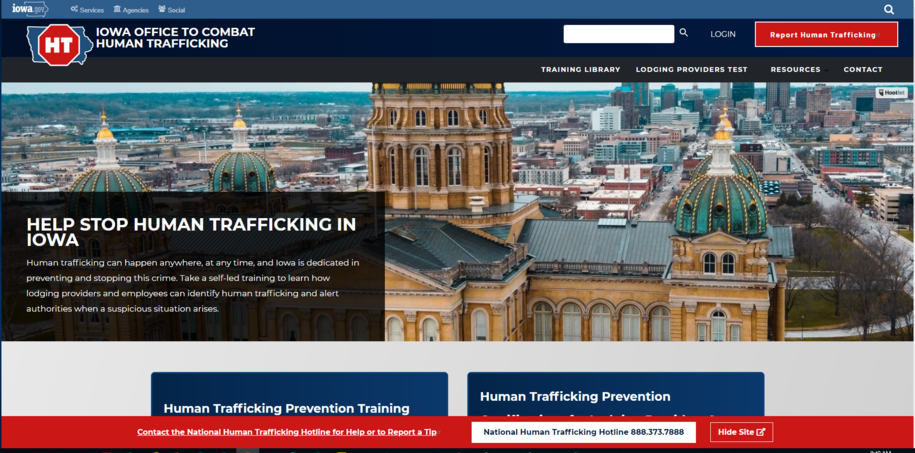November 29, 2021
DES MOINES, Iowa – Human trafficking is happening in communities across Iowa. Increased efforts to stamp out these horrible crimes will now include a new statewide training initiative within the lodging industry. In 2020, the Iowa Legislature passed a law (Iowa Code 80.45A) that requires Iowa lodging providers who host public employees or publicly-funded events and conferences to train their staff on human trafficking. The new law states:
Beginning January 1, 2022, affected lodging providers must have all employees successfully complete certified human trafficking prevention training in order to receive public funds as payment for services.
The scope of this new law will likely impact every community in Iowa as public funds may not be expended with any lodging provider that has not received the training certification. Public funds include moneys from the state, a county, school corporation, special district, drainage district, unincorporated town or township, municipality, or municipal corporation or any agency, board, or commission of the state or a political subdivision.
The Iowa Department of Public Safety’s Office to Combat Human Trafficking is charged with facilitating the new law and will be responsible for certifying the curriculum used in the training and that the lodging provider has met the training requirement.
The Iowa Office to Combat Human Trafficking is providing free online training that can be accessed 24/7 at its new website StopHTIowa.org. In addition to hosting the online training and an administrative portal, the site contains tips for spotting human trafficking activity The public-facing site contains an interactive map of state-certified lodging providers, as well as a list of organizations that are qualified to administer the training. To assist customers in determining a lodging provider’s compliance, all state-certified lodging organizations will be required to display their human trafficking training certification in the lobby or registration area.
“Human trafficking directly affects Iowa given our proximity to major metropolitan areas like Kansas City and Chicago, and the intersection of two major interstate systems,” said Department of Public Safety Commissioner Stephan Bayens. “As a result, we know human trafficking is happening in Iowa and that it frequently occurs in a hotel/motel setting. The goal of this training is to provide lodging staff with the knowledge and tools to quickly identify and respond to human trafficking, so together we can prevent this from happening in our state. Even one victim is one too many.”
Human Trafficking In Iowa
It is estimated that there are approximately 1,500 lodging locations in Iowa. Human trafficking is a crime involving the exploitation of youth under the age of 18 for commercial sex; the exploitation of adults for commercial sex through the use of force, fraud, or coercion; and the exploitation of any individual for compelled labor. Human trafficking does not require the transportation of individuals across state lines or that someone is physically restrained.
Like most crimes, human trafficking may be hidden from public view, and it can be challenging to determine the incidence and prevalence of the crime. The Iowa Office to Combat Human Trafficking has seen increased reporting of human trafficking activity occurring in Iowa, but it is difficult to say whether the increased reporting is the result of increased trafficking or more robust reporting.
Signs that a person is being trafficked can include:
• Working excessively long hours
• Unexplained gifts
• Physical injury
• Substance abuse
• Running away from home
• Isolation from others
• Being controlled or closely monitored by another.
If citizens see indicators of human trafficking or are being human-trafficked themselves, call 9-1-1 or call the Human Trafficking Hotline at 888.373.7888

ABOUT THE IOWA DEPARTMENT OF PUBLIC SAFETY
The Iowa Department of Public Safety (DPS) is the largest law enforcement agency in the state. It includes six divisions and several bureaus, all working together with local, state and federal government agencies and the private sector, to keep Iowa a safe place by following our core values: leadership, integrity, professionalism, courtesy, service and protection. Divisions within the Iowa DPS: Iowa Division of Criminal Investigation, Iowa Division of Narcotics Enforcement, Iowa State Patrol, Iowa State Fire Marshal Division, Iowa Division of Intelligence and Fusion Center, and Administrative Services Division. The Department of Public Safety is led by the Commissioner who is appointed by the Governor.
Iowa Department of Public Safety
215 E 7th St
Des Moines IA 50319
https://dps.iowa.gov